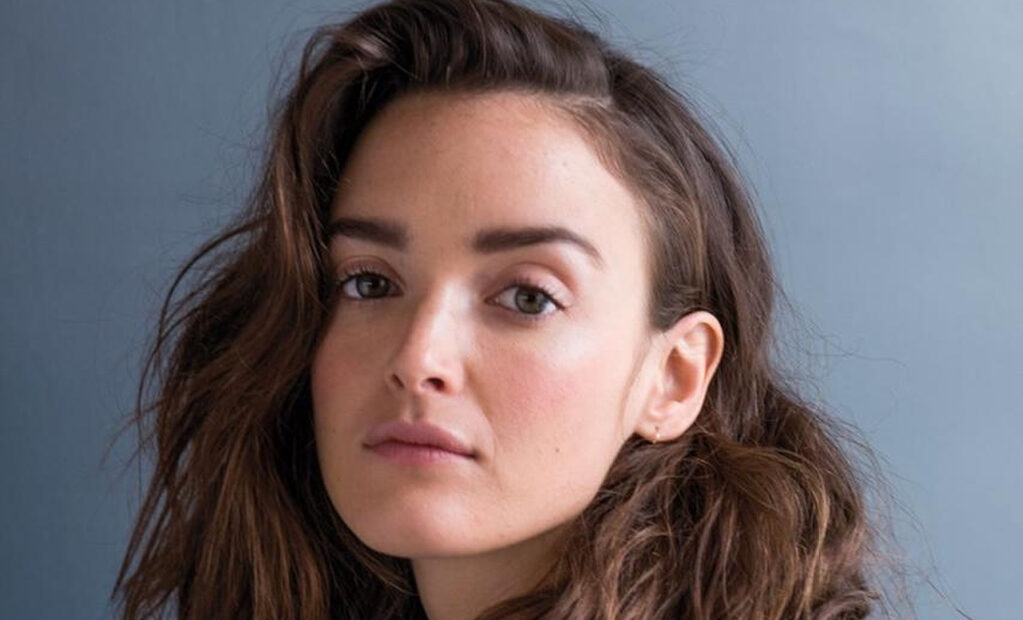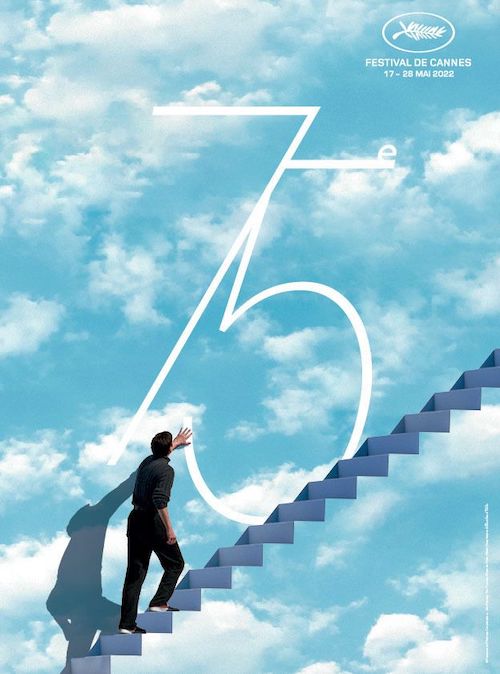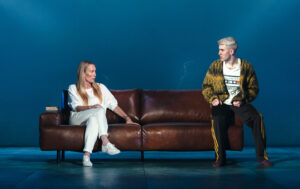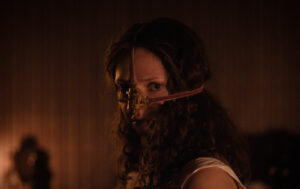Falcon Lake: An interview with director Charlotte Le Bon

Charlotte Le Bon is a familiar name to audiences of French film (for example, the 2014 biopic Yves Saint Laurent), as well as British (Anthropoid) and American (The Walk, The Promise) cinema. Earlier this year, the Canadian actress shocked viewers by portraying Sebastian Stan’s accomplice in the cannibal horror film Fresh. Now she is presenting her directorial debut at the Director’s Fortnight in Cannes, which is almost as hard to pigeonhole as the artist herself. Falcon Lake bridges the gap between nostalgic tales of youthful summers and haunting ghost stories.
The filmmaker spoke to us about how her own youth inspired her approach, but also her acting, and how unfortunate experiences with some directors worked as influences.
Falcon Lake is your first feature as a director. What made you want to step behind the camera?
I think it was a desire that was present for a while, I just wasn’t ready yet. I mean, I’ve always been drawing and painting and I always had that wish to tell stories through images. It’s just like a logical continuity for me to step behind the camera and to start directing. And obviously, being an actress for ten years helped me to really learn the work and to learn the all the technical aspects of the work of being a director. For me, it was the logical next step.
Does that mean you want to leave acting behind and work only as a director now?
Oh no, I don’t feel like I have to choose. I mean, I’ve been working as an actress and it was something like a bulimic way of working. I did, maybe, 17 movies in ten years? And I feel like I’ve learned a lot. I’ve been directed by some directors that I didn’t agree with; I have analysed their work and their way of directing actors and sometimes I was just disappointed with some of the results that I’ve seen. And I think there was also a feeling of frustration, sometimes, because I felt like, “I think I could do that, maybe better than what you’re doing.”
What was it about this story that made you decide it was something you wanted to tell?
It’s a free, very loose adaptation of a graphic novel called Un Soeur.
Somebody told me that, for a first movie, usually it’s always good to write and tell a story that you already know. And for me, it was the coming of age, obviously the first feelings of love, your first love, the first sexual impulses that you get when you’re a teenager, and you don’t know how to deal with it and you don’t know how to identify it. Really, there’s something about this mix of euphoria and fear that I saw. It was a dense – a vast subject that I could really explore. So, for me, it was a good way to start.
Yes, it’s not a classic coming-of-age story. How would you describe it in terms of genre – would you call Falcon Lake a thriller?
I don’t think it is a thriller. I think I’m flirting with genre codes; I think it’s a mix of a lot of things. The movie really, really feels like me, because I don’t have very good memories about my teenage years. I was a very lonely teenager – like, socially, I couldn’t find a group that I could fit in. I was really lonely and a little bit depressive.
And, I mean, often in cinema when we see movies about teenagers, it’s either all cute and innocent, or it’s, like, drugs and prostitution. And I felt like there’s another thing in the middle, where it’s just sometimes really dark and you can’t identify the feelings that you’re going through. I think the world that I created – the strangeness of it – is a way to reflect what was happening inside of me as a teenager.
Also, I feel like my first big shock in cinema was horror movies, because, when I was a teenager or when I was a young child, there is this thing: you watch a movie and you’re not allowed, because of your age, and you watch it in secret. Then you feel scared, and it stays with you for a lot of days. So yeah, my movie just really feels like me, is what I would say.
Your work with the young actors is very impressive. There’s actually another film here at Cannes, The Worst Ones, which deals with all the difficulties and things to consider when working with child actors, because they haven’t grown as people yet. How was your experience working with your young cast?
I think being an actress for ten years really helped me with that, because I mean, first of all, there’s really sensitive scenes in the movie, like all the sexual scenes and stuff like that. It was really important for me to create a bond with them. I wanted them to feel safe. I didn’t want any taboos on-set. And it was really important for me that they could trust me, so that was the main priority. The real work was just to create that bond and that trust. And after that it was just a feeling of – in French we call it “bienveillance” [benevolence] – when it comes from a good place, a place of respect and you love the actors that you’re working with. I mean, then I think there is no way it can go bad.
As for directing them, I feel like usually the directors that don’t know how to direct actors are ones that don’t understand the heart of a scene. I think the second you understand the heart of the scene, it’s really easy to just find the best way, to find the right instruction for the actors to get to that heart.
Why did you not want to cast yourself in your film?
Because I’m not interested in that. Maybe one day I’ll be interested. But I feel I already have difficulty to just watch a movie I’m acting in. So to film myself, to judge the work that I’m doing, I don’t know if I’m interested in doing that. Also I feel like, with acting, you need to be vulnerable. You need to trust, you need to let go. And directing is the complete opposite of that. So I feel like those two exercises are, for me, for the moment, incompatible.
Have you gone back to acting after Falcon Lake?
Most recently I’ve been acting in a French Canadian series called C’est Comme Ça que Je T’Aime and just before that I was in a movie called Fresh, directed by Mimi Cave.
Of course, Fresh was a Sundance sensation! How was this project for you?
It was nice to play a villain for a change. Because I’ve been cast as always like super nice and bubbly kind of girls, and I was fucking tired of it. So it was really, really nice to finally get to play something else. That’s why I was interested in doing that part, even though it’s a secondary character. I was really excited to do it.
Do you get offered much from the US?
No, not that much. But it’s fine – I mean, acting is not the main part of my life. I feel like this is kind of a side thing, that provides sometimes some kind of gratification, but it’s not the heart of my life.
What is the heart of your life?
Oh, creating stuff and telling stories. That’s what really fulfils me.
So why did you take so long to make a feature?
I mean, I was already an artist. I was drawing and painting and doing photographs, and I wasn’t ready yet to just step behind the camera. You have to learn the skills, you have to learn all the technical aspects of it. It took time for me to observe and analyse. Being an actress for ten years was my film school.
Do you exhibit your art around the world? Where has been your most recent exhibition?
Around the world? No, I exhibit only in Paris.
The most recent one is right now actually. It’s a group exhibition in a gallery called Item. And it’s a group show alongside beautiful artists – David Lynch is part of the group as well, and William Kentridge, Jean-Michel Alberola… Yeah, it’s part of a very beautiful group.
How long have you lived in Paris?
Ten years… a little bit more – maybe 12. I moved there because I was a model in the beginning of my 20s, then I auditioned for a TV show that I did for one year, while it was a new show. I was writing and doing sketches every night on live TV for a year. That was popular. I did, like, “okay” stuff and I did really bad stuff.
What was the bad stuff?
Oh man, I mean, when you have to write every day – and I had to come to the office at 10am, and then every day of the week, from Monday to Friday, at 5pm, I had to add a text, like a sketch. So that was actually also a good school for writing, and trying to find a rhythm and understand comedy. But it was really hard. I did that for a year, so I did 200 sketches in one year. There was something on live TV every night. So yeah, that was also a very good school. And after that, I started to do acting and cinema.
Are there any acting projects in your future?
For the moment, there’s only one part that I’m interested in. It’s a biopic on a French-American artist called Niki de Saint Phalle. It’s written and directed by Céline Sallette, who’s also a French actor, and it’s going to be her directorial debut. I don’t know when it’s going to be shot, but that is the only project I’m attached to as an actress, for the moment.
Something that really stands out about Falcon Lake is that amazing location. How did you go about finding it?
I took so long. It’s weird, because when I wrote the script, and I send it to my French to Canadian producers, they were like, “Oh, this is going to be easy. We’ll just find a beautiful house on a lake.” Easy? It took us a year and a half to just find the right house. We had to find the right houseand we had to find different locations for the lake. Because we wanted to find the right orientation with the sun. That was a long process, but it was worth it. I’m really happy with the result.
Am I right in assuming that it was shot on film?
Yes, it was shot on 16mm.
And why was that?
For multiple reasons. I feel the movies that stayed with me and that inspired me, when I was young, were all movies that were shot on film because because digital didn’t exist yet.
Also, it’s a film about sensuality. In film, there’s a texture with the skin, the light, the colours, that you can’t compare to digital. I feel like digital is just always trying to copy what film is doing.
Then there’s a good thing about using film, which is that it implies a discipline on set, because we have a physical material that we have to respect. You can’t be in a fury of just doing lots and lots of takes – like, you have to know exactly what you’re doing. Your actors, they have to be tight; they have to know exactly what they’re doing. And I felt like that really helped us on set.
So did you spend a lot of time rehearsing before the shoot?
Unfortunately, my main actor could only arrive one week before the shooting, because he had to finish school and his parents were very strict about that. He was 14 when we shot. But we did a lot of Zoom calls together. We read the script multiple times via Zoom, but it’s not the same thing. And I didn’t want to rehearse too much, because I wanted the scenes to still be fresh.
I’m not the type of director who is like, “You have to say the exact words that are on the pages”. It was like, ”Just use your own words.”
But the thing that we really rehearsed were the sexual scenes, because I wanted it to be very choreographed, so they would feel at ease at it.
Did you have an intimacy coordinator?
I don’t think there was one… I was the intimacy coordinator. I was like, “Everybody out!”.
But, no, that was it. Those scenes were… when we shot them, it was really easy, because we talked about it before and we were making jokes.
Actually, the scene that he hated the most was the dancing scene. That was the thing that he was the most shy about.
Did you get him to learn dancing?
No, the other way around. He danced already. I knew that and that’s why I put that in the script.
Will he go on to do other films?
I hope so. I mean, they are all really talented.
I know that Joseph is scared of doing castings. For the moment, he has always been offered parts without doing a casting. And Sara is a very talented young actress, who I’m sure has a huge career in front of her. Hopefully we’ll see more of them!
Selina Sondermann
Falcon Lake does not have a UK release date yet.
Read more reviews from our Cannes Film Festival 2022 coverage here.
For further information about the event visit the Cannes Film Festival website here.
Watch the trailer for Falcon Lake here:


























Facebook
Twitter
Instagram
YouTube
RSS